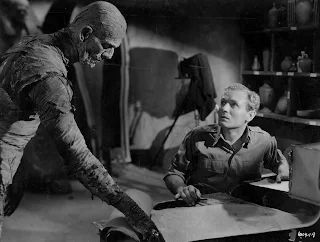Classical scholars have a name for the fictional device of
the “discovered manuscript: pseudo-documentarism. It is a device that goes back
quite a ways in the Greek world, with hints in, say, Plato’s dialogues, but
that really comes into its own, according to Karen Ni Mheallaigh, in the first
and second centuries A.D. Mheallaigh emphasizes the way the discovered
manuscript both addresses the materiality of the text and blurs the line
between fictional and historical truth.
“Pseudo documentarism in its various manifestations raises
the stakes sharply in the game of make-believe, because it asks readers not
only to concede the text's fictional truth but also to enter into the fantasy
of historical truthfulness as well: in other words, it fictionalizes the issue
of historical truth – an ethically worrying thing to do – and in doing so, it
tests the limits of the reader's grasp of the rules that govern make-believe.
The finer the line distinguishing fact from fiction, it seems, the keener the
frisson of readerly pleasure becomes.” (Pseudo-Documentarism and the Limits of
Ancient Fiction: Karen Ní Mheallaigh,
The American Journal of Philology 2008)
Good as far as it goes, but I think that there is another
aspect – the productive dimension of the document – that gets pushed a little
to the side here. After all, the exchange that happens is not only covered by
the ‘contract’ with the reader, but by the contract between discoverer and
author. The fiction after all creates an interesting editorial relationship
where the author (who, we think, “really” composed the text) is transformed
from the producer to the publisher, from the laborer to the manager, or
administrator.
Like discovery in general in the West (an ideological unity
that could be defined in terms of ‘discovery’ and “invention”, since discovery,
as we know, signifies the erasure of the discovered peoples, or at least their
subordination as subjects who can be discovered, but aren’t themselves
discoverers, while invention is accorded to the discovering nation as the sign
of its intellectual superiority), the discovery of the manuscript, the
document, comes with a history of why it had to be discovered – why its
producers either lost it, or chose to hide it, or – in more catastrophic
stories – why the culture in which it was produced was buried. Discovery turns
a use object into a treasure, with its very special terms of exchange. If the relationship between the writer and
reader is a “contract”, the publication of the discovered document points to a
more primary broken contract. One of those Derridian paradoxes that, in our
flat age, we are forgetting about.
In a colloquy on the motif of the manuscrit trouvé held in the Louvain in 1999, one of the
participants, Jan Herman, quotes a passage from Vivant-Denon’s Travels to Lower
Egypt that gives us a wonderful
dialectical image of the discovered manuscript. The passage comes just
after Vivant-Denon, who was one of the scholars enlisted by Napoleon for his
attempt to conquer Egypt, is speculating about Egyptian writing and the
possibility of Egyptian books, after having uncovered a stele on a dig:
I couldn’t help but flatter myself in thinking that I was
the first who had made a discovery of such importance; but I congratulated
myself even more when, some hours afterwards, I was blessed with the proof of
my discovery by coming into possession of a manuscript that I even discovered
in the hand of a superb mummy that had been carried to me. You have to be a
true collector, amateur and voyager to appreciate the total scale of my joy. I
felt myself almost faint: I wanted to argue with those who, in spite of my
pleading, had violated the integrity of this mummy, when I saw clutched in his
right hand and under his left arm the manuscript of a papyrus scroll, which I
would never have seen without this violation: I couldn’t speak; I blessed the
avarice of the Arabs, and above all the chance that had offered me this good
fortune; I didn’t know what to do with my treasure, having so much fear of
destroying it. I didn’t dare touch this book, the most ancient of all books
known until this day, and I dared not confide it to anyone, or put it anywhere.
All of my bedding cotton did not seem to me sufficient to softly wrap it up.
Was this the history of some personage? The epoch of his life? Was the reign of a sovereign under whom he had served
inscribed there? Was it some theological
dogma, some prayers, or the consecration of some discovery?”
Note that even before Vivant-Denon begins to read it (which,
if it were in Egyptian, he didn’t have the capacity to decypher), the
discovery itself is the result of broken contracts, of violations of the most
sacred sort. It is the underside, perhaps, of the history of pillage that calls
itself the civilizing mission that violation is followed by contract, by care –
the torn sheets of the mummy replaced by the sheets of bedding of the French
savant. Only a truly contracting culture could pillage with such a clear
conscience. But the contract at some
point doesn’t work to mollify worry. At this point, the dead come back. At this
point, the gothic takes over. At this point, the editor/finder has a hard time
convincing himself that he is not the stealer/robber, and that the avarice of
the “arabs” is amplified ten times, a hundred times in his case.



